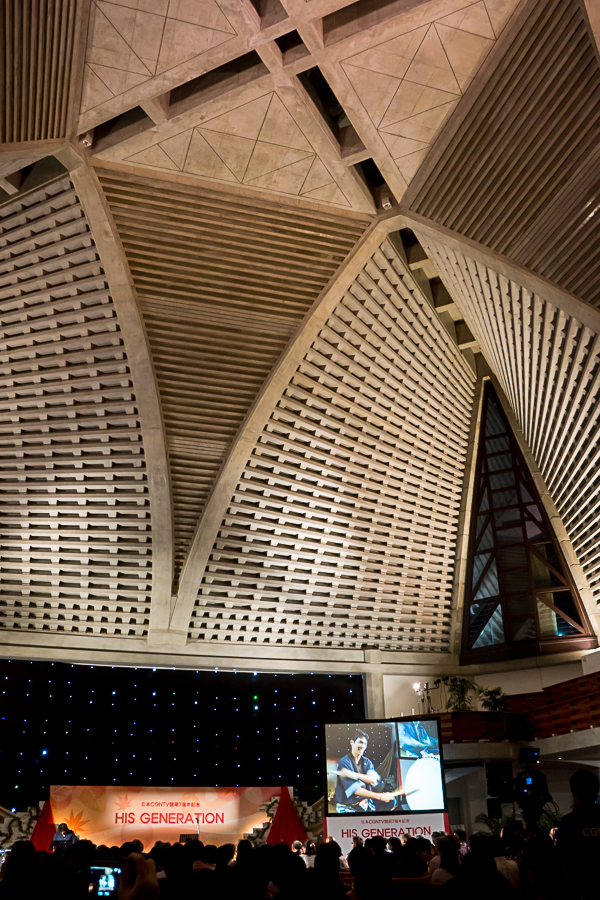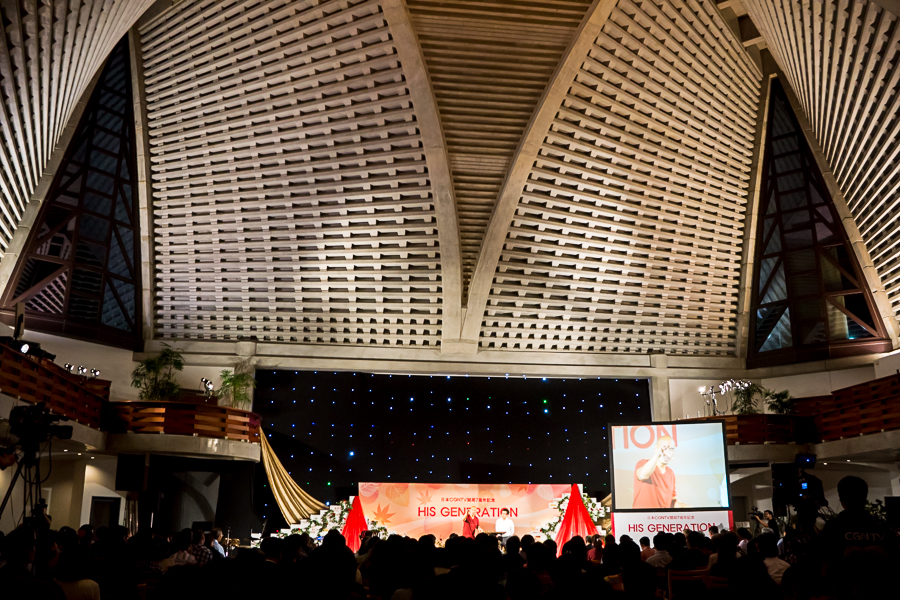
CGNTV is a Christian broadcasting organization that works in several countries around the world, and is based out of the Korean Onnuri Church. The director of operations in Japan is a former student of mine at the Covenant Seminary and CGN did a feature show on Hydi and her ministry a while back so we feel some connection with them. CGNTV is currently celebrating the seventh anniversary of broadcasts in Japan and the featured event was a couple of big name American preachers; David Platt and Francis Chan. I must confess to having never heard of either of them; but that’s my loss. Anyway, last night we went to hear Francis Chan speak. It was a large scale event by Japanese Christian standards, using the Yodobashi Church sanctuary, which is one of Tokyo’s largest church buildings. It was standing room only and the night began with a wadaiko performance (Japanese drumming), followed by a time of congregational singing led by a worship band, then an inspiring performance by Korean tenor and cancer survivor Jaechul Bae, and then the featured speaker, Francis Chan. At the close of the event there was an offering (the purpose or focus of which was oddly never revealed), more singing and then a time of small group prayer.
Francis Chan stated that his desire was to encourage Japanese Christians since this isn’t an easy place to be a Christian. And I have to say that for many Japanese Christians who come from small churches, any time they are able to be surrounded by a huge crowd of passionate Christians, especially fellow Japanese Christians, it is encouraging! Chan began by bringing his young daughter on stage and giving an emotional, (American) father’s perspective on how unthinkable it was for God the father to allow his son to be crucified for others. His daughter was an amazingly good sport considering how uncomfortable it could have been for any young girl her age! It was also an interesting glimpse into the humble and human side of this famous speaker, but unfortunately for most Japanese people, it probably felt rather awkward and odd. We aren’t in the habit of publicly caressing our loved ones and praying to God Almighty at the same time in this country. Oh well, you can’t fault him for being frank and honest.
The congregational singing was loud, at times inspiring, and led by a capable band. Unfortunately at least 75% of it was in English…! That may have had nothing to do with Chan, but honestly, how encouraging can that be for Japanese Christians? It’s like telling them that to really reach those pinnacle moments in praising God, you have to do it in English. They did short portions of a few songs in Japanese but it felt like little more than a token nod. Sure, there were a lot of English speakers in the audience, but according to Chan the goal was to encourage Japanese Christians. I’m afraid the singing probably made the Japanese in the crowd feel like second class members of the family of God, whose language isn’t quite good enough to really “get your praise on”.
Chan’s message was a bit rambling in nature but he seemed to have three basic points.
- The first was how incredible it is that the power of God who raised Jesus from the dead is alive and present in each one of us. He wanted the listeners to realize how amazing that is and his main thrust seemed to be that with this kind of power present in us, we should have no problem putting to death the sins that remain in our lives. He was careful to point out that it isn’t our power but the power of the Holy Spirit.
- His second point was that the church is called upon to practice an extreme form of selfless love that should amaze rest of the world. He gave the example of a church member giving his kidney to another church member. The point was that within the body of Christ people love each other in a way that is not seen in the rest of the world, and that when our church really starts to do that, it will grow and people will begin to believe in great numbers.
- The third point was that we should remain bold in our faith, just like the early church was. He gave a personal example of confession, talking about reading thru old sermons of his and realizing that he is losing his boldness over time, and he gave an illustration of the static of the world around us, comparing it to the noise in a pachinko parlor; saying that this is how Satan tries to get into our heads.
In the end I came away feeling rather empty. Maybe that’s my problem more than anything else, but it just felt like the Gospel he was talking about was really skewed and incomplete. And yet I’m afraid that based on the limited exposure I have to a lot of the Christianity in the U.S. and especially in mega-churches, this is in fact the Gospel that is most popular right now. So what’s my beef with Chan’s message? It’s the almost exclusively inward focus. As a child of the pietist tradition, I am keenly aware of the importance of always examining our own walk with the Lord and seeking to draw closer. But that was only one part of the Gospel embraced by the pietists. The other and equally important half is being engaged in the world to which we are sent, carrying out the work that Jesus began. (Mt.22:37-40) And yet Chan’s message was almost entire devoid of any mention of or even reference to that half of the Gospel. Sure, he talked about selflessly loving others, but it was very clearly and specifically limited to something that happens within the church. The only times he mentioned the rest of the world outside the church was when he said they would be shocked if they ever came into the church and saw how we Christians love each other; and then in his conclusion he stressed the importance of shutting out the world and all it’s distractions, likening it to the overwhelming noise of a pachinko parlor, in our attempt to be more focused on God and more bold in our faith.
So to summarize, we are to shut out the world, and the only time they will see us and the love we practice is when they come into the church and observe. From my perspective that is a seriously twisted presentation of the Gospel. We are called to be the light of the world, the salt of the earth! Jesus didn’t only practice his radical love on his little “in crowd”. No, in fact he almost exclusively focused it on the rest of the world. He trained, discipled and mentored the people in his little group of followers, but the bulk of his time and energy were spent loving the masses in word and deed. If we want to follow Jesus that is where we are called; not to some church where we are unusually nice to each other. The obvious opportunity that he missed here was to affirm the body of Christ in Japan for the incredible way in which they have stepped out their buildings and worship services, gone beyond the boundaries of the local church, and shared the tangible love of Jesus Christ with the victims of 3.11. That is where we’ve really seen Christ at work in and thru the church here in Japan. But instead he chose to only talk about being nice to other Christians.
The third point was equally troubling because his example from the old sermon he re-read was so fundamentally flawed. Apparently he had described an intensely moving experience of witnessing the birth of his son, and also seeing his daughter helping in the delivery. He talked about how incredible it felt as a father to be there and see that happen. But then the kicker in this old sermon, preached back in the days when Chan says he was more passionate in his faith, was his claim that however intense and moving that experience was, his devotional time with Jesus later in the week had been far more intense and far more moving! Whoa!!!! I just have one question. Why wasn’t Jesus allowed to be present during the child birth? Why was it that this event of new life, this testimony to God’s miracle of creation, was somehow deemed by Chan to be just a lowly event of this world that didn’t have anything to do with Jesus, and why did he have to have a separate devotional time later in the week in order to “spend time with Jesus”? That isn’t passionate faith. It’s just myopic, and narcissistic self aggrandizement. Like his personal devotions is so incredibly important and gets him so close to God that nothing else compares. Sure, quiet times are important. Jesus relied on them all the time. But he never dissed the obvious and glorious works of God taking place right before his eyes because he somehow thought his solitude was more important. And yet I guess this sort of fits in with my previous objection. The core of the message is all about how we are supposed to try and get closer to God, become better Christians, and be more passionate about our faith. But the piece that’s missing is the second command of Jesus. Love your neighbor! This is how we put faith into action here on earth; by loving the world. Not by having more intense personal devotions, not by thinking of the world as something akin to the loud and distracting sounds of a pachinko parlor, and not by just focusing more on the incredible power that dwells within us. Those things aren’t wrong, but when we are told to do them at the expense of paying attention to the world around us it just doesn’t sound like the Gospel of Jesus any more.


